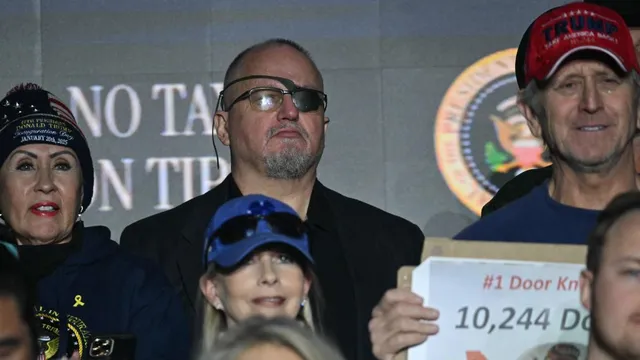
Judge bans Oath Keepers from D.C. after Trump commutes sentences
2025-01-27 13:36- District Court Judge Amit Mehta ordered Oath Keepers members to stay out of Washington, D.C.
- The order was issued after President Trump commuted their sentences in connection with January 6 incidents.
- This ruling emphasizes ongoing judicial oversight despite executive actions concerning clemency.
Express your sentiment!
Insights
In January 2025, District Court Judge Amit Mehta ruled that members of the Oath Keepers, a far-right militia group, are prohibited from entering Washington, D.C. without court permission. This ruling came after President Donald Trump commuted the sentences of Oath Keeper members convicted for their roles in the January 6 attack on the U.S. Capitol. Among those affected by the ruling are Stewart Rhodes, the group's founder, and seven others who received lengthy prison sentences for seditious conspiracy. Following their commutations, Rhodes and his co-defendants were seen on Capitol Hill, leading to heightened tensions between the judicial and executive branches regarding oversight of their cases. The acting U.S. Attorney for Washington, D.C., Edward Martin, opposed the judge's order, arguing that commutation means these defendants are no longer under the court's jurisdiction. This dispute highlights the complexities surrounding the aftermath of the Capitol attack and the processes of legal accountability for those involved. As the legal battle continues, it raises critical questions about the implications of clemency in cases concerning insurrection and the potential risks posed by individuals who have previously expressed violent intent against democratic institutions.
Contexts
On January 6, 2021, the United States Capitol experienced an unprecedented attack that has had lasting repercussions on American society and politics. This event took place as Congress was in session to certify the Electoral College results of the 2020 presidential election, affirming Joe Biden’s victory over then-incumbent Donald Trump. In the weeks leading up to January 6, Trump and some of his allies promoted baseless claims of widespread election fraud, which mobilized thousands of his supporters to gather in Washington, D.C. for a rally that day. Trump’s speech incited the crowd, encouraging them to march to the Capitol and "fight like hell." This rhetoric was pivotal in transforming a peaceful demonstration into a violent insurrection against the democratic process in the United States. As rioters breached the Capitol building, the impact was immediate and violent. Hundreds of individuals overwhelmed law enforcement, breaking windows and doors to gain access inside while also confronting and injuring police officers. Lawmakers were forced into hiding, and the certification process was halted as the Senate and House chambers were evacuated. The scene was chaotic, with rioters vandalizing offices and stealing property. The events of January 6 led to the death of five people, including a Capitol Police officer, and numerous injuries sustained by law enforcement and participants alike, marking a dark chapter in American history. In response to the attack, the U.S. government initiated a series of investigations and legal actions. The FBI and other agencies worked extensively to identify perpetrators and held many accountable through arrests and prosecutions. Additionally, it spurred significant discussions about security protocols at the Capitol and the events leading up to that day. As a result of the attack, authorities implemented new measures aimed at preventing such incidents in the future and reviewing the security failures that allowed the breach to occur. On an institutional level, the attack prompted a second impeachment of Donald Trump by the House of Representatives, citing incitement of insurrection. The January 6 Capitol attack has left a lasting legacy and continues to influence American political discourse. It has raised critical questions about political rhetoric, accountability, and the future of democracy in the United States. Public opinion has remained polarized, with ongoing investigations and debates about the motivations behind the attack and the involvement of various groups and individuals. The event underscored the vulnerabilities of democratic institutions and the necessity for vigilance and reform to uphold the rule of law and protect democratic processes.